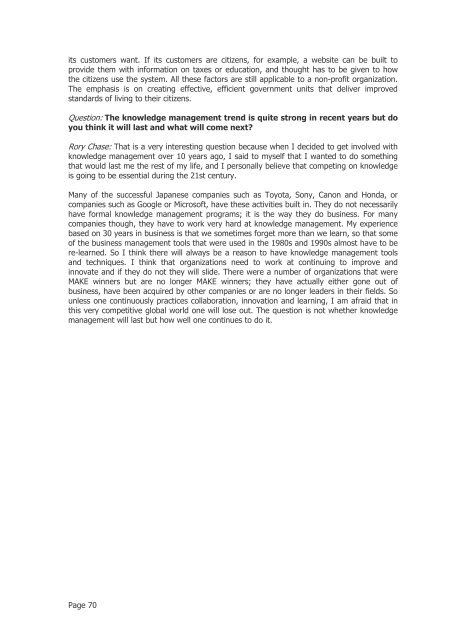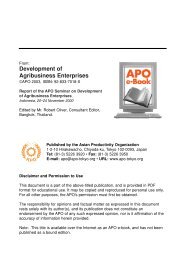Knowledge Management: From Brain to Business (PDF 5.5 - Asian ...
Knowledge Management: From Brain to Business (PDF 5.5 - Asian ...
Knowledge Management: From Brain to Business (PDF 5.5 - Asian ...
Create successful ePaper yourself
Turn your PDF publications into a flip-book with our unique Google optimized e-Paper software.
its cus<strong>to</strong>mers want. If its cus<strong>to</strong>mers are citizens, for example, a website can be built <strong>to</strong><br />
provide them with information on taxes or education, and thought has <strong>to</strong> be given <strong>to</strong> how<br />
the citizens use the system. All these fac<strong>to</strong>rs are still applicable <strong>to</strong> a non-profit organization.<br />
The emphasis is on creating effective, efficient government units that deliver improved<br />
standards of living <strong>to</strong> their citizens.<br />
Question: The knowledge management trend is quite strong in recent years but do<br />
you think it will last and what will come next?<br />
Rory Chase: That is a very interesting question because when I decided <strong>to</strong> get involved with<br />
knowledge management over 10 years ago, I said <strong>to</strong> myself that I wanted <strong>to</strong> do something<br />
that would last me the rest of my life, and I personally believe that competing on knowledge<br />
is going <strong>to</strong> be essential during the 21st century.<br />
Many of the successful Japanese companies such as Toyota, Sony, Canon and Honda, or<br />
companies such as Google or Microsoft, have these activities built in. They do not necessarily<br />
have formal knowledge management programs; it is the way they do business. For many<br />
companies though, they have <strong>to</strong> work very hard at knowledge management. My experience<br />
based on 30 years in business is that we sometimes forget more than we learn, so that some<br />
of the business management <strong>to</strong>ols that were used in the 1980s and 1990s almost have <strong>to</strong> be<br />
re-learned. So I think there will always be a reason <strong>to</strong> have knowledge management <strong>to</strong>ols<br />
and techniques. I think that organizations need <strong>to</strong> work at continuing <strong>to</strong> improve and<br />
innovate and if they do not they will slide. There were a number of organizations that were<br />
MAKE winners but are no longer MAKE winners; they have actually either gone out of<br />
business, have been acquired by other companies or are no longer leaders in their fields. So<br />
unless one continuously practices collaboration, innovation and learning, I am afraid that in<br />
this very competitive global world one will lose out. The question is not whether knowledge<br />
management will last but how well one continues <strong>to</strong> do it.<br />
Page 70
















